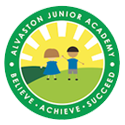Writing Implementation at AJA
“You can make anything by writing.” – C.S. Lewis
At Alvaston Junior Academy, we aim to create a positive reading and writing culture in school, where both are promoted, enjoyed and considered a pleasure for all pupils. We ensure that the teaching of writing is purposeful, robust and shows clear progression for all children.
In order to help us to develop confident, enthusiastic writers, who can express themselves in a variety of different styles and across a variety of contexts, our teaching of writing is often cross circular and linked to our class topics. This provides our children with regular opportunities to write for a range of purposes and audiences. Writing tasks are specific and meaningful, and meet a purpose to engage children and to illustrate how their writing skills can be applied to real life contexts.
Each year group has a yearly overview of the writing genres, both narrative and non-fiction, that they will teach. These have been planned to ensure correct coverage of the key genres as well as build on skills from year to year. Units will take either two or three weeks to complete; the outcome of each unit is an Extended Write which is used to assess the pupil’s skills against the agreed success criteria. Every unit is taught through the use of a quality text, which exposes the children to inference, high-level vocabulary, a range of punctuation and characterisation. Each text is purposefully selected in order to promote a love of reading, engagement and high quality writing from each child. The text that acts as a stimulus for teaching the identified text, word and sentence level features that children are expected to include in their extended writing outcome for that unit. A WAGOLL – What a good one looks like – is created based on the stimulus text and supports pupils to identify and mimic the identified features in their own writing. The educationalist Alan Peat devised a number of sentence types, which have been proven to enhance progress and attainment in children’s writing; we teach these throughout the school.
Within each unit the required grammar and punctuation knowledge and skills are taught through the genres of writing; linking it to the genre to make it more connected with the intended writing outcome. Teachers sometimes focus on particular grammar and punctuation skills as stand alone lessons, if they feel that the class need additional lessons to embed and develop their understanding or to consolidate skills. As well as teaching the objectives, teachers are able to embed the skills throughout the year in cross-curricular writing opportunities and ensure that most children are achieving the objectives at the expected level and that some children can achieve at a greater depth standard. Any areas of weakness that are identified as a result of independent writing, are taught as part of the next modelled text, in focused SPaG sessions or during grammar starters.
Writing is assessed consistently throughout the year through mini writing tasks and the end of unit Extended Write. Teachers use this to assess the areas that their children will need to be specifically taught, even if this means tracking back to objectives from previous years, in grammar and text type. Interventions on specific areas of weakness are carried out by the class teacher or teaching assistant. Termly, teachers assess writing using official moderation materials. Teachers moderate within year groups and across year groups in time for data drops throughout the year. Teachers set children personalised targets, which relate to the National Curriculum and the “Key Performance Indicators” (KPI’s) specific to each year group to ensure progress and target areas for support.
Within lessons, teachers and teaching assistants target support for lower ability children to enable them to achieve at an age-related level wherever possible. This may involve a greater level of scaffolding and access to additional support materials such as Toolkits, Word Banks, a greater level of modelling or scaffolding. Higher ability children are given opportunities to extend their writing in a variety of ways, including through showing greater control in their writing, a deeper understanding of the impact that their writing has on the reader and by using a higher level of vocabulary and grammar features.
Around the school, there are displays of writing to encourage pride in work, give a purpose and audience and to show that work is valued. The fortnightly ‘Presentation Award’ encourages children to ensure they are using a neat, fluent handwriting style and helps to ensure children are maintaining the same standard of writing across all subjects.

